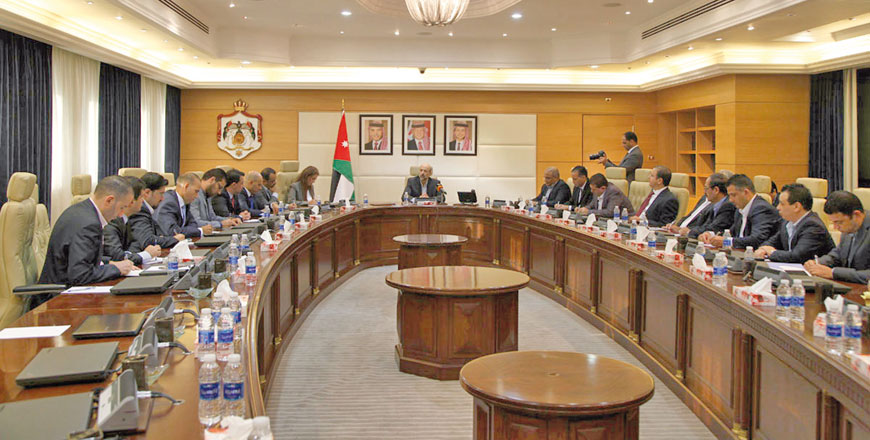AMMAN — The new income tax draft law was developed “without any dictations from any entity and will help achieve the desired fiscal reform”, which will contribute to lowering Jordan’s borrowing costs, Prime Minister Omar Razzaz said on Tuesday.
The bill, which is published on the Legislation and Opinion Bureau’s website for feedback for 10 days before being referred to the Lower House, will trigger economic growth and enhance solidarity and justice in the society, the premier said at a meeting with the media on Tuesday.
The bill seeks to generate JD280 million in additional revenues in 2019, of which JD180 will be collected as a result of expanding the taxpayers’ base, while the rest will be generated as an outcome of effective combating of tax evasion.
The latest draft law exempts families whose yearly income does not exceed JD18,000 and removes an additional exemption of JD4,000 for households that present bills of medical treatment or education.
It also exempts individuals whose yearly income does not exceed JD9,000.
According to Razzaz, 90 per cent of military retirees, civil servants and Social Security Corporation (SSC) pensioners will not be affected by the bill.
He acknowledged that “it is not easy to sell the law to the public in light of the current difficult economic conditions and we stress that it is tailored towards the well-to-do companies and individuals”, Razzaz said.
The premier stressed that the amended tax law was not imposed by anyone or any entity whether from inside Jordan or outside.
“This is our decision…. We are aware that the expectations are high but the challenges are formidable and cannot be solved overnight,” he noted.
According to the premier, some loans will be due in 2019 at a time when the country’s annual debt service is around JD1 billion and the interest rate is around 4 per cent.
Jordan needs to achieve the desired fiscal reforms in 2019 so the interest rate does not go up, he said.
If Jordan takes the risk of postponing fiscal reform and goes to lenders next year without having such reforms implemented, the interest rate on the Kingdom’s borrowing is likely to increase significantly, he added.
“We do need to expand the taxpayers’ base, which is a national interest… we do need to revisit the sales tax and that is also a national interest, and we will combat tax evasion, which is also a national interest,” the prime minister told reporters.
No additional taxes were imposed on banks as the current income tax on banks is one of the highest in the world, according to Razzaz, who cited “studies by various institutions”.
Income tax was increased on the telecom sector from 24 per cent to 26 per cent.
According to the draft bill, 1 per cent was imposed as social solidarity tax on income of individuals that is subject to income tax, and the same percentage was imposed on the net profits of companies to fund scientific research and combat poverty.
The premier stressed that there was a need for reconsidering sales tax, noting that around three quarters of the tax burden on Jordanians is in the form of indirect taxes, mainly sales tax.
However, the government can only make a decision about the percentage of sales tax based on the volume it can collect next year through measures to fight tax evasion. The government is likely to take some decisions soon to exempt some essential commodities that affect the low- and limited-income Jordanians from the sales tax including fruit, vegetables and agricultural production inputs, he said.
In addition to efforts aimed at increasing revenues, the government will continue working on reducing expenditure, he said, acknowledging: “But that is not enough to address the budget deficit,” he added.
“The public sector has a huge fleet of vehicles and around 15-20 per cent of public agencies’ and ministries vehicles are not used. This is a big waste that will be addressed,” he said.
Revenues to be generated through enforcing the bill will be directed to improving services in various fields including health and public transport “so that citizens can feel a tangible difference”, said the premier.
The incumbent government’s version of the tax law is seen as not very different from that proposed by the previous government led by Hani Mulki, who had to resign under popular pressure and youth-led protests against the draft law.
